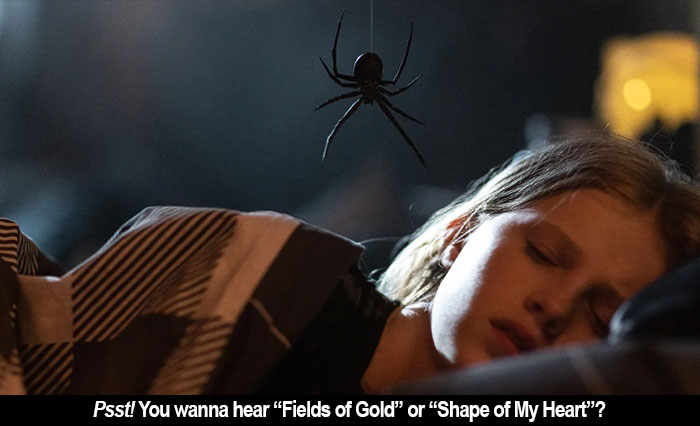STING
***½/****
starring Ryan Corr, Alyla Browne, Penelope Mitchell, Jermaine Fowler
written and directed by Kiah Roache-Turner
Vermines
***½/****
starring Théo Christine, Sofia Lesaffre, Jérôme Niel, Finnegan Oldfield
written by Sébastien Vanicek and Florent Bernard
directed by Sébastien Vanicek
by Walter Chaw If Jeff Wadlow’s Imaginary and John Krasinski’s If are opposite sides of the same coin, so, too, are Kiah Roache-Turner’s Sting and Sébastien Vanicek’s Infested: the first pair identifying a desire for imaginary friends, the second a desire for anthropomorphized things with which to share our otherwise empty and desperate lives. Each offers different nightmare scenarios for what happens when we try to escape into our fantasies of saviours and second–or first–comings. Each serves as a warning that we are the only thing that can save us; everything else is just a distraction. (I know If is meant to be a kid’s movie, but holy shit.) When patterns appear in our culture, I find it useful to at least begin a conversation about why that might be. I mean, when fish start floating belly-up to the surface of your pond, it seems dense not to wonder what’s in the fucking water. With only a few months left until our last election, it seems a good time to leave a monument here to the bleak timeline saying that pretty much everyone saw everything coming with clarity and rage and eventually resignation and despair once it was proven the people who could make a difference had already come and gone. We are cursed to live in interesting times, and we’re loath to suffer them alone.
In Sting, little weirdo Charlotte (Alyla Browne, concurrently seen in Furiosa) has the run of her grandmother Gunter’s (Robyn Nevin) South Brooklyn tenement, where Charlotte’s well-meaning nebbish stepfather Ethan (Ryan Corr) earns room and board as the caretaker. One evening during a blizzard, Charlotte explores the building’s ventilation system and comes upon a tiny alien spider freshly hatched from a meteorite. She immediately identifies it as a best friend destined to live in a mason jar she carries with her for this purpose. Sting has a Frank Oz Little Shop of Horrors cum Gremlins vibe to it, a “made for twisted children” energy; it takes delight in its depravity, in its nihilism, in the verging-on-obnoxious “wanna see something scary?” invention that sits at the heart of these fairy tales about lonesome children neglected by their loved ones, nursing a beast until said beast becomes unmanageable. It’s the kind of movie that would launch an old lady out the window via a mechanical chairlift, the kind of movie that would devote a musical number to a sadomasochistic dentist.
Charlotte feeds her new bestie roaches she gathers, teaching Sting to whistle when it’s hungry. “Spiders can’t do that,” says creepy neighbour Erik (Danny Kim), an amateur ichthyologist engaged in a few weird experiments of his own when Charlotte approaches him for the use of one of Erik’s spare fish tanks. “Can a spider double its size in a couple of days?” she asks him, piquing Erik’s interest. “No,” he says, eyebrows raised in surprise, “that’s physiologically impossible.” Erik is neurodivergent, deadpan, a freak, really, and he deserves a movie all his own. He promises to take care of Sting, and by that he means…well, that would be telling. Sting is fleet and nasty. It does a great job of showing Ethan’s desperation to maintain his self-esteem and the respect of Charlotte’s mom, Heather (Penelope Mitchell), while on his mother-in-law’s payroll. But at the movie’s centre is the accidental confederacy of Charlotte and Erik in raising this interstellar orphan–E.T. by any other name–into a killing machine that systematically wipes out every single subsistence-level tenant in the middle of a late-stage metropolis. Here’s the kind of nostalgia I like: not another chapter in a dimly-remembered intellectual property, but rather a mid-budget genre flick that captures precisely the electricity surrounding the stuff Joe Dante used to pump out with regularity.
Kaleb (Théo Christine) is the Charlotte of Infested, a street-smart punk prowling the working-class suburbs of Paris for bootleg kicks and the occasional rare reptile or insect. Closing a deal for a buddy in his, yep, rundown tenement, he can’t help but ask his shady fence to throw in a particularly aggressive eight-legged fucker we’ve witnessed being harvested from an archeological dig somewhere in the Middle East. Part of a melting-pot diaspora of Black, Arabic, and Eastern European immigrants relegated to the outskirts of mainstream French society, Kaleb instantly identifies with the uprooted and trafficked spider, so that when the spider goes hog-wild after inevitably (and immediately) escaping its shoebox oubliette, we see in its outrage and insatiable hunger the desire of an entire population to be recognized as prisoners of their socioeconomic circumstances.
Or, you could treat Infested like another loaded but fun ride in the vein of Attack the Block: an action powerhouse that carries with it a potentially devastating subtext it doesn’t need to be an effective genre exercise. Vanicek’s affection for his impoverished heroes and their ramshackle living conditions is obvious and endearing. Long before the spiders become the problem, it’s the plumbing and the heating, the cracks in the plaster, the unreliable electricity, which finds most of the common areas lit by bulbs on short-timers. This constant state of disrepair is the Chekhov’s Gun of Infested. When shit gets heavy, the heroes’ inability to navigate the tangle of their broken environment is one complication, while the general disinterest of the authorities in policing what they see as a slum feeds into the mayhem of the picture’s final third. Infested is about how neglect and misunderstanding always end in tragedy: for children, naturally, but also for entire societies, pushed into barrels for the ease of genocidal exterminators. I wanted to be cute and say that Sting is as timeless as Infested is timely, but let’s face it: they’re both timeless.






